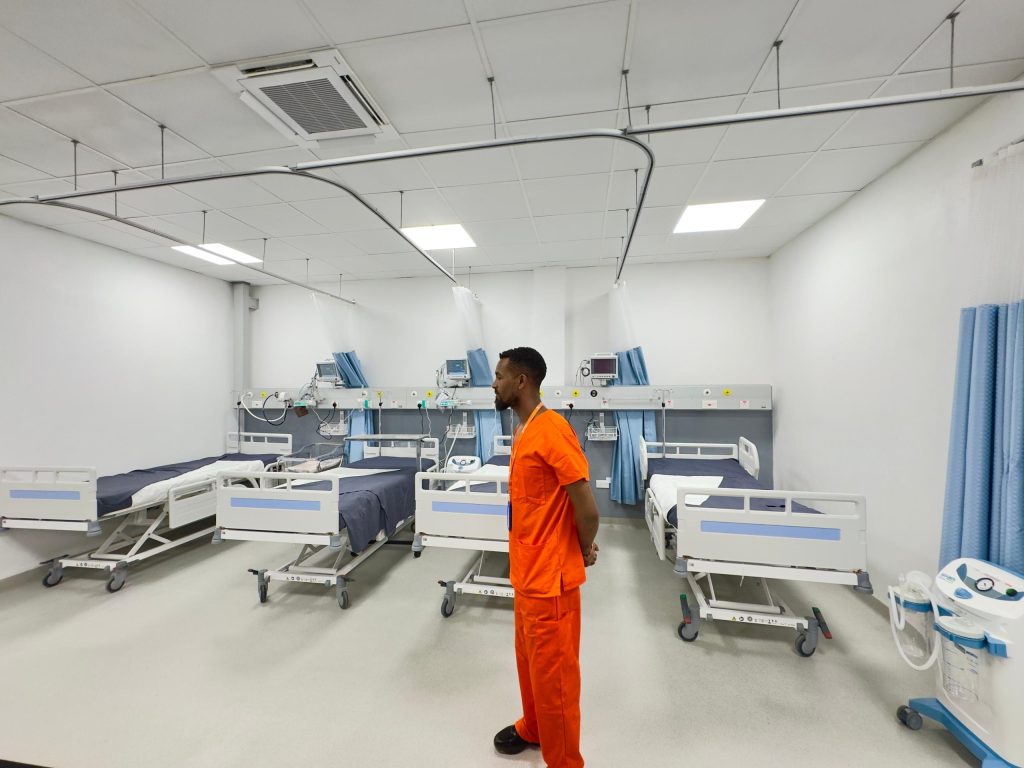Analysis
Previously dubbed as the worst place for women to become mothers, Sierra Leone’s journey at rewriting this troubling healthcare narrative has been truly remarkable. Within the shortest period of time, maternal deaths have been slashed by over 60%, one of the steepest declines in the Africa Sub-region. The Government has now set sights on making these gains permanent by collaborating with Partners In Health (PIH) to significantly invest in the construction of a maternal center of excellence; a state-of-the-art facility that is set to truly revolutionize services for women and children. Today, President Julius Maada Bio commissions not just a building, but a facility that ushers in a new era of hope and development for the people of Kono and beyond.

Koidu City, Kono District, 25th October 2025.
The birth of a new era has begun in Koidu City, Kono District, as President Julius Maada Bio commissions Sierra Leone’s first ever maternal center of excellence (MCOE); an ultra-modern health facility set to massively transform healthcare for women and children. Made possible through strong collaboration with the international NGO, Partners In Health (PIH), the new edifice is named after PIH’s late co-founder, Dr. Paul Farmer, to reflect his legacy of lifelong dedication and commitment to providing quality healthcare to people in underserved communities around the world.
This latest facility, built in what was once the epicenter of blood diamonds in Sierra Leone, is equipped with cutting-edge technology to help change not just the once damning healthcare narratives, but also to represent a massive symbol of development and hope for the people of Kono. While addressing a highly excited crowd at a ribbon cutting ceremony that ushered in a new era of change, President Bio emphasizes the massive difference MCOE will make to consolidate the gains in maternal and child child outcomes.

“The MCOE is not just a hospital, it’s a bold statement that achieving zero preventable maternal deaths in this country is possible. My government is determined to ensure that every woman receives the highest quality healthcare possible and this new facility will make sure of that,” the President pointed out with a radiant smile on his face.
Designed to provide advanced maternal and newborn health services, the MCOE has drastically expanded Koidu Government Hospital’s (KGH) campus by increasing its 48-bed maternal ward and special care baby unit (SCBU) to an impressive 120-bed capacity, including the country’s first neonatal intensive care unit (NICU).
This new hospital will not just provide quality care by leveraging on global best practices, it will serve as a hub for training the next generation of Sierra Leonean maternal health experts–doctors, nurses, and midwives–equipping them with the necessary skills and supplies to provide international services in a well-resourced environment.
Staff trained at the MCOE are expected to be shining examples of professionals who graciously embody clinical excellence, empathy, and dedication; a legacy that will elevate maternal and newborn care in Sierra Leone and beyond. Additionally, a dedicated training site and dormitory is being built just 10-minute drive away from the MCOE campus to provide a dynamic environment where clinicians can learn, grow, and thrive. The campus will have a 60-bed dormitory, a training center with one classroom, two lecture halls, two simulation rooms, and a computer lab and library.

“Every mother, every child, deserves a chance at life. No mother should die while bringing life to this world,” President Bio pointed out, emphasizing that the MCOE stands at the heart of his human capital development agenda as enshrined in the government’s “Big Five Agenda,” the President said.
For the Minister of Health, Dr. Austin Demby, the MCOE is more than just bricks and walls, “it’s a beacon of hope that symbolizes the Government’s unwavering commitment to nurturing the next generation of healthcare professionals.”

Dr. Demby emphasizes that while the gains achieved in maternal and child health are worth celebrating, the Government is firmly committed to further reducing the current figures down from 354 to achieving the UN’s SDG’s of less than 70 deaths per 100,000 live births by 2030. Dr. Demby believes that the MCOE will contribute immensely towards achieving this goal.
“This hospital is a testament to the fact that every nation once defined by war and fragility, can truly heal, rebuild and thrive.”
Another exciting part of this brilliant story is that the facility was “built by women for women” with female workers constituting up to 65% at the peak of the construction. These women were trained as laborers, quality assurance managers, and construction supervisors. The organization, Partners In Health, defines their contribution as fundamental to the project’s advancement as well as demonstrating women’s ability to build and promote access to quality health care for women.
Minister Demby meanwhile expressed excitement and hope for the future, calling on health workers to use the facility to heal, teach, innovate and deliver services with compassion and dignity. The MCOE will not be a stand-alone institution, he said. “Its successes will be woven into the investment already made in other facilities around the country, ” Minister Demby pointed out.
Dr. Demby said that the Government has increased the number of doctors produced in this country by tenfold and increased healthcare training facilities, including the establishment of a medical school at Njala University, a midwifery school in Kenema that will train fit-for-purpose midwives.

He expressed gratitude to the team at PIH, especially its late co-founder, Dr. Paul Farmer, describing their work as profound. “You have not only built a hospital. You have built hope and possibilities for the people of this country. As a Government, our journey so far has been marked by strong collaboration with right partners, like you, sharing our vision and commitment to serving the people of this country.”

The commissioning of this modern health facility; by far the best this country has ever seen, represents a true breath of freshness for excellence. The coming months will be defining as staff are expected to undergo further intensive training and orientation process, patient flows will be refined, and essential systems—from supply chains to data infrastructure—will be tested and optimized. During this period, maternal health services will continue to be available at KGH, but the facility is expected to open to patients in February 2026.

